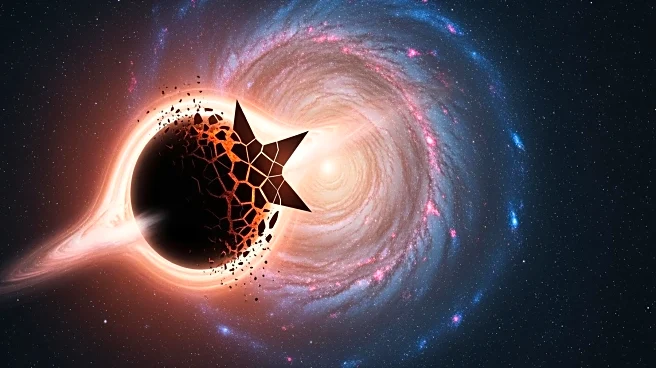What's Happening?
Astronomers have detected a significant cosmic event where a black hole is tearing apart a star, marked by radio signals captured by the U.S. National Science Foundation National Radio Astronomy Observatory
(NSF NRAO) and other partner telescopes. This event, designated AT 2024tvd, is notable for being the first radio-bright tidal disruption event (TDE) observed outside a galaxy's center. The discovery, led by researchers Itai Sfaradi and Raffaella Margutti from the University of California, Berkeley, provides insights into the behavior of massive black holes in unexpected locations across the universe. The radio signals evolve rapidly, offering a unique opportunity to study the dynamics of material ejected from the vicinity of black holes.
Why It's Important?
This discovery is crucial for understanding the behavior of black holes and their impact on surrounding cosmic structures. The rapid evolution of radio signals from AT 2024tvd challenges existing theories about tidal disruption events, which typically occur at the center of galaxies. The findings could lead to new insights into the distribution and activity of black holes, potentially affecting theories of galaxy formation and evolution. The ability to observe such events outside galaxy centers may expand the scope of astronomical research, offering new opportunities to study cosmic phenomena and their implications for the universe's structure.
What's Next?
Researchers plan to continue monitoring the radio signals from AT 2024tvd to gather more data on the event's progression. Higher-resolution radio imaging may reveal additional details about the material ejected by the black hole, enhancing understanding of tidal disruption events. The ongoing study could lead to further discoveries of similar events, providing a broader understanding of black hole activity and its effects on cosmic environments. This research may also inform future astronomical missions and the development of new technologies for observing distant cosmic phenomena.
Beyond the Headlines
The detection of AT 2024tvd raises questions about the distribution of black holes and their role in shaping cosmic environments. The event's location, away from a galaxy's center, suggests that black holes may be more widespread than previously thought, potentially influencing the dynamics of galaxy formation and evolution. The rapid evolution of radio signals challenges existing models of tidal disruption events, prompting a reevaluation of theories regarding black hole behavior and their interactions with surrounding matter. This discovery may lead to new approaches in studying cosmic phenomena and understanding the universe's complex structure.










